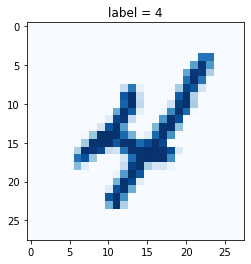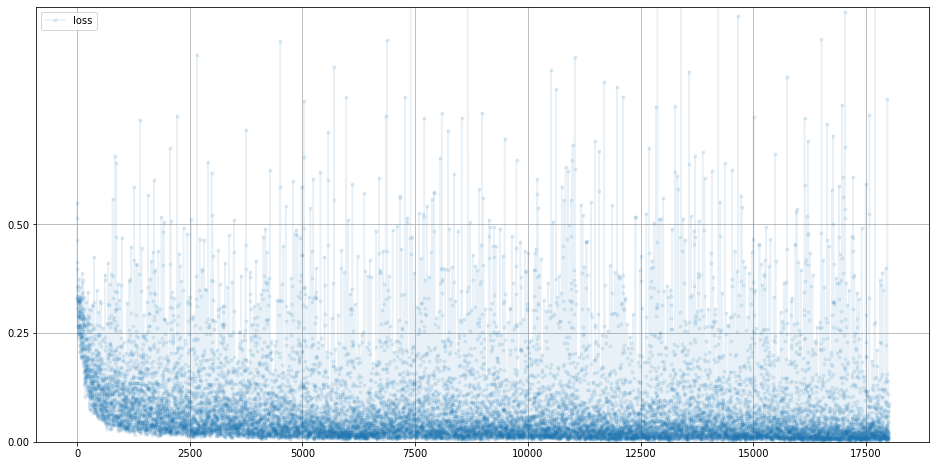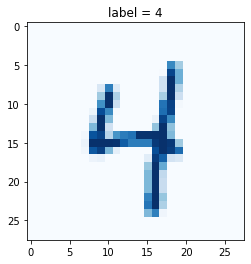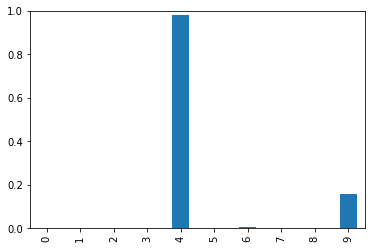[GAN] Enhancing the Performance
# GAN 03 Enhancing the Performance
from google.colab import drive
drive.mount('./mount')
Mounted at ./mount
import pandas as pd
df = pd.read_csv('/content/mount/My Drive/ColabNotebooks/myo_gan/mnist_data/mnist_train.csv', header=None)
import matplotlib.pyplot as plt
import torch
import torch.nn as nn
from torch.utils.data import Dataset
# classifier class
class Classifier(nn.Module):
def __init__(self):
# initialise parent pytorch class
super().__init__()
# define neural network layers
self.model = nn.Sequential(
nn.Linear(784, 200),
nn.Sigmoid(),
nn.Linear(200, 10),
nn.Sigmoid()
)
# create loss function
self.loss_function = nn.BCELoss()
# create optimiser, using simple stochastic gradient descent
self.optimiser = torch.optim.SGD(self.parameters(), lr=0.01)
# counter and accumulator for progress
self.counter = 0
self.progress = []
pass
def forward(self, inputs):
# simply run model
return self.model(inputs)
def train(self, inputs, targets):
# calculate the output of the network
outputs = self.forward(inputs)
# calculate loss
loss = self.loss_function(outputs, targets)
# increase counter and accumulate error every 10
self.counter += 1
if (self.counter % 10 == 0):
self.progress.append(loss.item())
pass
if (self.counter % 10000 == 0):
print("counter = ", self.counter)
pass
# zero gradients, perform a backward pass, and update the weights
self.optimiser.zero_grad()
loss.backward()
self.optimiser.step()
pass
def plot_progress(self):
df = pd.DataFrame(self.progress, columns=['loss'])
df.plot(ylim=(0, 1.0), figsize=(16,8), alpha=0.1, marker='.', grid=True, yticks=(0, 0.25, 0.5))
pass
pass
class MnistDataset(Dataset):
def __init__(self, csv_file):
self.data_df = pd.read_csv(csv_file, header=None)
pass
def __len__(self):
return len(self.data_df)
def __getitem__(self, index):
# 이미지 목표(레이블)
label = self.data_df.iloc[index, 0]
target = torch.zeros((10))
target[label] = 1.0
# 0~255의 이미지를 0~1로 정규화
image_values = torch.FloatTensor(self.data_df.iloc[index, 1:].values)
# 레이블, 이미지 데이터 텐서, 목표 텐서 반환
return label, image_values, target
def plot_image(self, index):
img = self.data_df.iloc[index, 1:].values.reshape(28, 28)
plt.title("label = " + str(self.data_df.iloc[index, 0]))
plt.imshow(img, interpolation='none', cmap='Blues')
pass
pass
mnist_dataset = MnistDataset('mount/My Drive/Colab Notebooks/myo_gan/mnist_data/mnist_train.csv')
mnist_dataset.plot_image(9)

%%time
# 신경망 생성
C = Classifier()
# MNIST 데이터에 대해 훈련 진행
epochs = 3
for i in range(epochs):
print('training epochs', i+1, "of", epochs)
for label, image_data_tensor, target_tensor in mnist_dataset:
C.train(image_data_tensor, target_tensor)
pass
pass
training epochs 1 of 3
counter = 10000
counter = 20000
counter = 30000
counter = 40000
counter = 50000
counter = 60000
training epochs 2 of 3
counter = 70000
counter = 80000
counter = 90000
counter = 100000
counter = 110000
counter = 120000
training epochs 3 of 3
counter = 130000
counter = 140000
counter = 150000
counter = 160000
counter = 170000
counter = 180000
CPU times: user 3min 39s, sys: 2.36 s, total: 3min 41s
Wall time: 3min 40s
C.plot_progress()

# load MNIST test data
mnist_test_dataset = MnistDataset('mount/My Drive/Colab Notebooks/myo_gan/mnist_data/mnist_test.csv')
# test trained neural network on training data
score = 0
items = 0
for label, image_data_tensor, target_tensor in mnist_test_dataset:
answer = C.forward(image_data_tensor).detach().numpy()
if (answer.argmax() == label):
score += 1
pass
items += 1
pass
print(score, items, score/items)
9035 10000 0.9035
# pick a record
record = 19
# plot image and correct label
mnist_test_dataset.plot_image(record)

image_data = mnist_test_dataset[record][1]
# 훈련된 신경망으로부터 쿼리
output = C.forward(image_data)
# 텐서 출력
pd.DataFrame(output.detach().numpy()).plot(kind='bar', legend=False, ylim=(0,1))
<matplotlib.axes._subplots.AxesSubplot at 0x7f67cea4f090>



Leave a comment